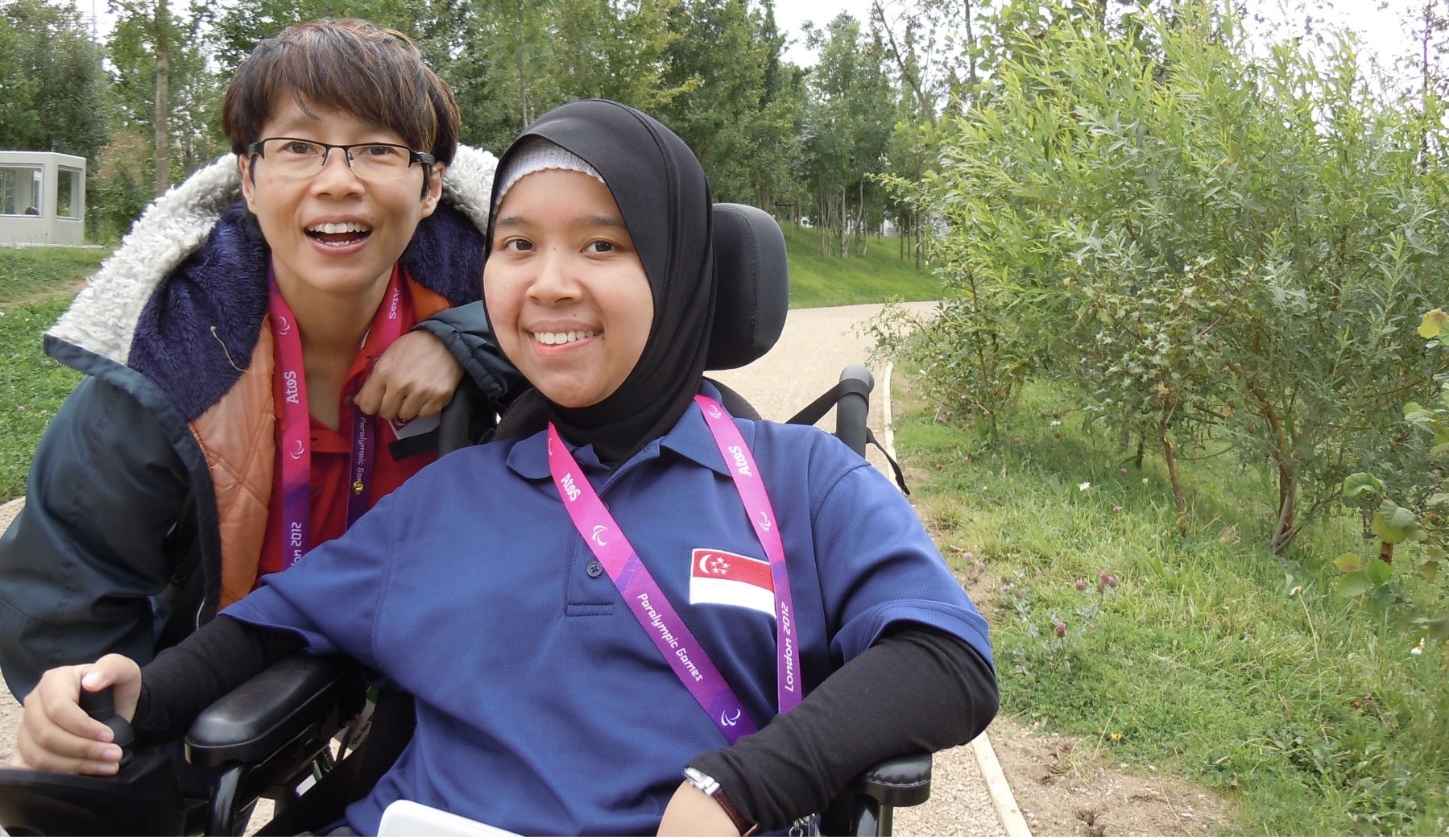Love is infectious too, say 4 families who quarantined with their school kids
by Gemma Koh // June 10, 2021, 11:08 pm
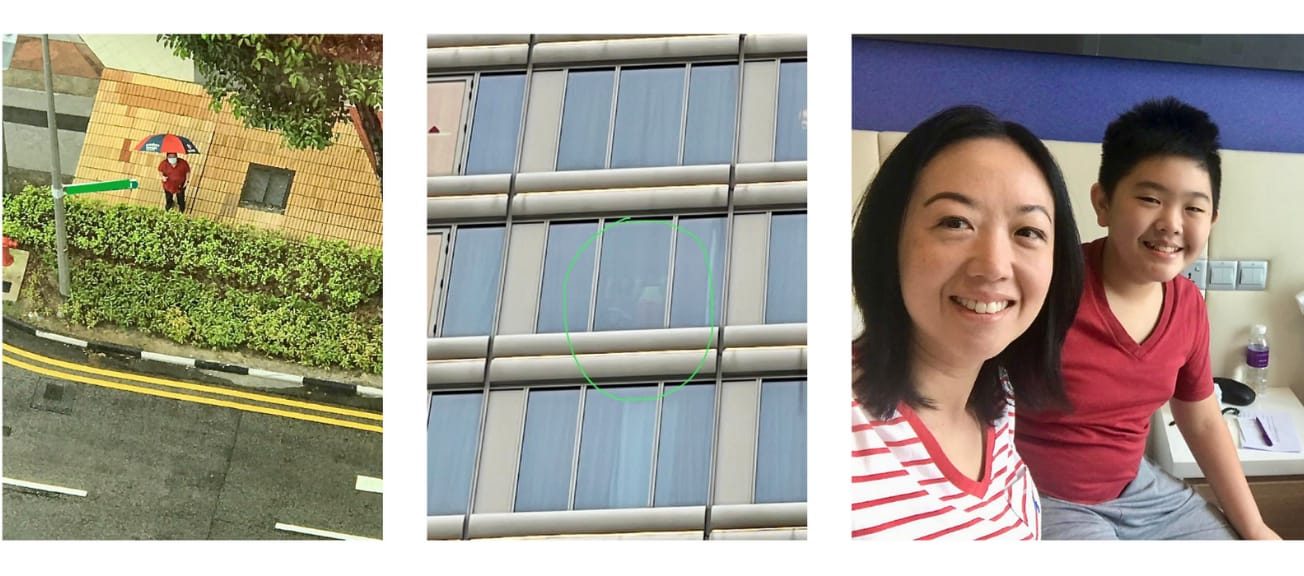
Rain or shine, Dr Fabian Ong (left) – who worked nearby – would come to wave to his wife Kemmy Koh and their son, Reuben, 11, who were quarantined in a small room on the 10th floor (centre) of a hotel. Photo courtesy of Kemmy Koh.
When her 8-year-old daughter’s classmate at St Margaret’s Primary School tested positive for Covid, mum Melissa* was aghast.
Her daughter’s classmate was part of a cluster of several students who had been in close contact with a tuition centre teacher.
Forty-two students in 30 schools tested positive for Covid-19 in four weeks. Entire classes and their teachers were quarantined.
It meant that each member of her daughter’s class would be served with a Quarantine Order (QO) and would need to be isolated along with a parent.
According to a May 21 news report, 42 students in 30 schools in Singapore had tested positive for Covid-19 in four weeks.
Entire classes of students and their teachers were quarantined.
From May 19, all centre-based tuition and enrichment classes for those under 18 were moved online till June 13 or until further notice.
Singapore schools were put on full HBL (home-based learning) from May 19 until May 28 (the day before the June term break) in an effort to stem the surge of student Covid cases.
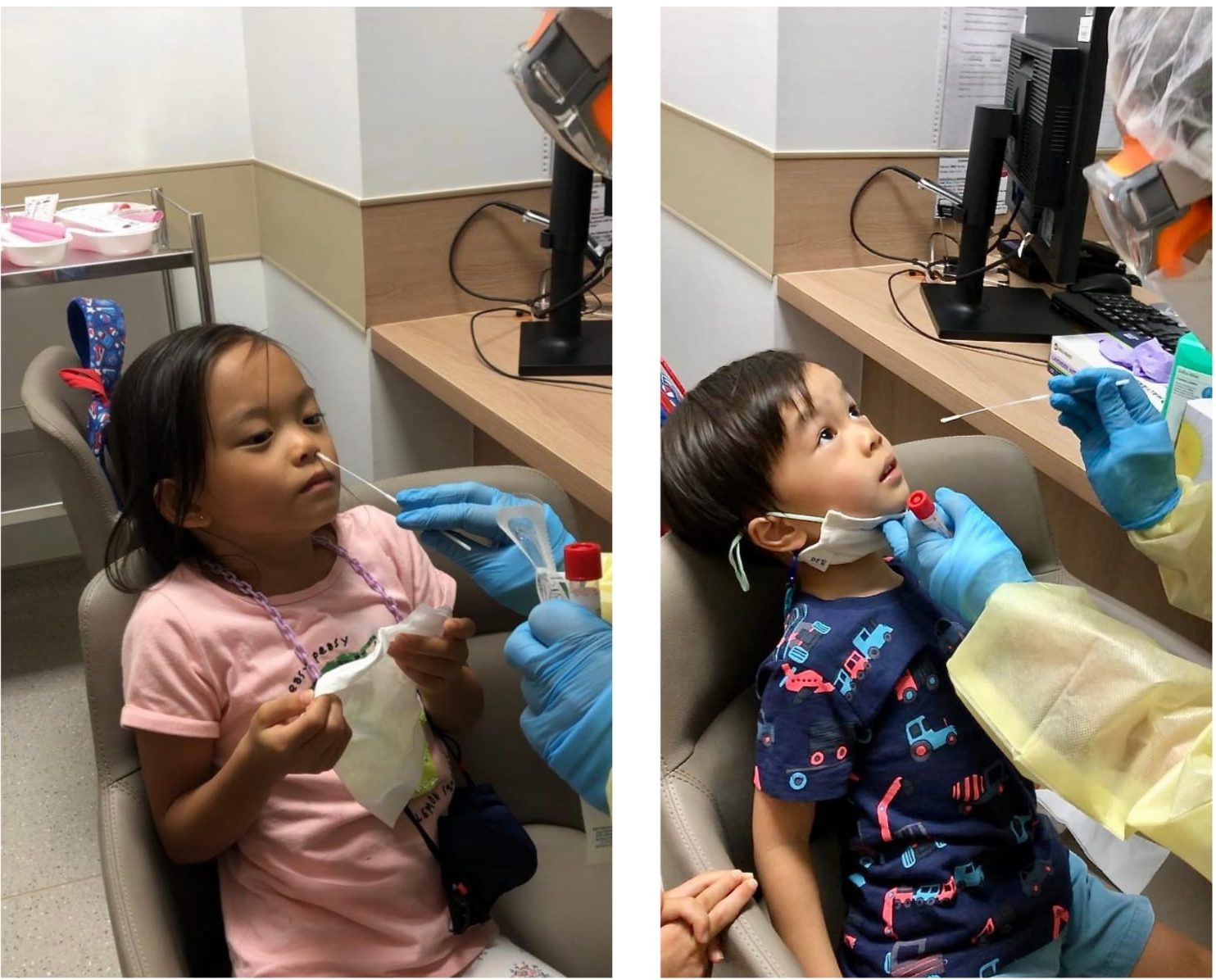
Grace Chong (left), 7, who is in Primary One of a girls’ school with a Christian ethos and culture, and her brother Joash, 4, who is in nursery, were taken to a children’s hospital to get swabbed.
Families were initially sick with worry.
On the day her daughter was supposed to be released from the quarantine, Melissa wrote on Facebook that “While no words can adequately describe the trauma, anxiety, distress, sense of helplessness, frustration and mental/emotional strain that my family and those of Stephanie’s* (her daughter’s) classmates have experienced in the last 12 days, I want to share lessons that I am learning during this time.”
The four families Salt&Light spoke with shared about the uncertainty and stress in the quarantine process. At least one also received scam calls.
But they all emerged safely, with newfound peace and gratitude.
Appreciating the “unseen workers”: Melissa* & family
Melissa’s husband spent 15 days – including three extra days because of a mix-up – in home quarantine with their daughter, Stephanie*, 8, and their cat. Melissa and their helper moved out. The cat “was a Godsend” for their daughter who has slight autism. Melissa works in marketing in F&B; her husband is in HR. Both are 41 years old.
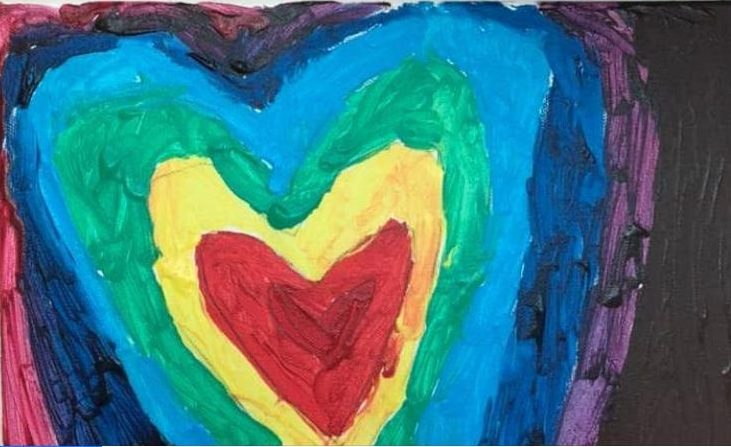
Melissa’s daughter painted this heart rainbow using acrylics while in quarantine. “The black paint is the storm, the brown paint is the mud and mess that is the result of the storm. The heart is the rainbow after the storm,” the 8-year-old explained to her mum. Said Melissa: “I was blown away that my child who is quote-unquote ‘special needs’ can paint like that. Even though she was scared, she remained joyful. It gave me hope.” Photos courtesy of Melissa.
When her husband and their daughter came back from their first swab test, he was moved to tears because of the kindness shown to their daughter by the driver who had ferried them to the swab centre and the staff at the centre.
He told Melissa that when he had said goodbye and “hang in there” to a woman at the swab centre, she started crying.
“Many of them (at the swab centre) get shouted at. Not many people acknowledge the work they do.”
“Many of them get shouted at. Not many people acknowledge the work they do,” Melissa said.
It put things in perspective for her.
“No matter what inconveniences, stress, trauma we’ve suffered, we can move on.
“But these people go through so much more on a daily basis to keep us safe. Many are working overtime, not sleeping, not stopping for meals.
“As upset as we are, can we not lose sight of the fact that we are very, very privileged, and that God has been good to us? Can we extend that kindness and patience to the frontliners?”
She decided to show appreciation to the “unseen workers” by gifting them with goodie bags on behalf of Primary Three Graciousness, her daughter’s class.
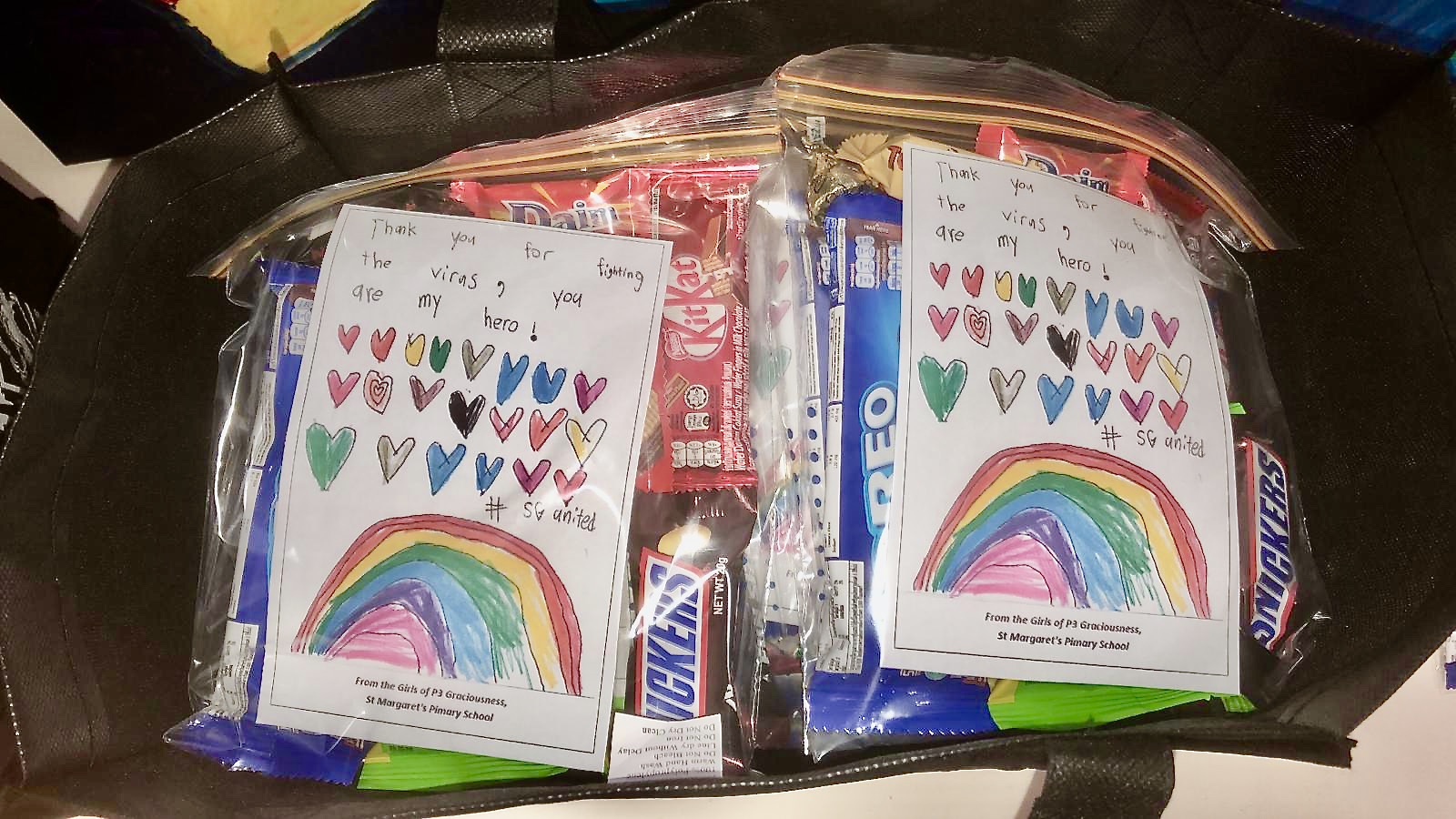
Melissa (who was not quarantined) and another mum (who had completed her quarantine) packed appreciation goodie bags on behalf of their daughters’ class. The packs were distributed to drivers who ferry those under quarantine to swab tests, frontline workers from MOH, staff at the hotel where most of the girls were isolated, and Certis Cisco officers who are QO agents.
“A lot of times, my daughter has asked me, ‘What does graciousness mean?’ I’ve always had problems describing it. There is a lot more nuance to the word than the dictionary definitions of kindness and patience. It is also compassion. That’s what I want to teach my daughter.
“In doing the care packs, we could teach the girls how to be gracious, how to be kind, even though their circumstances are not that great,” said Melissa, adding that some of the girls quarantining in hotels “were scared, breaking down every day because they wanted to go home”.
“We wanted to show the girls that they can either chose to wallow … or they can bring joy to other people.”
Through Zoom sessions a mum organised for the girls, Melissa also noticed “how cheerful some of the girls were. That spoke of their resilience, resolve and courage. It was very inspiring. For me, that could only be God,” she said.
“We wanted to show the girls that, when they are going through difficulties, they can either chose to wallow, fall into depression, blame others, create unnecessary drama. Or they can reach out and make a difference by bringing joy to other people. That is their choice. And we all have that choice. If we teach our children that, then meaningful change will happen.
“We have to be the change we want to see.
“Being angry, blaming and criticising others for what went wrong is easy. But that’s not going to build an atmosphere of trust, which is what is needed to create open forums of discussion for meaningful change to happen.”
The change is not just for parents and their children, but also to make life better for the ground staff and frontline workers “who have borne – and continue to bear – the brunt of the pandemic”.
Choosing gratitude: Kemmy Koh & family
For 12 days, stay-at-home mum Kemmy Koh, who is in her 40s, was isolated with son Reuben Ong, 11, in a hotel room. Reuben’s Primary Six classmate – and subsequently the boy who sat behind this pupil – were diagnosed with Covid. Reuben has a 16-year-old brother.
One of the first things Kemmy Koh did when she returned home from quarantine was to slide her own bathroom door open and close with a grateful smile and a sigh.
During a 12-day quarantine in a hotel room with her son, a Primary Six pupil whose two classmates had tested positive for Covid-19, the mother and son were assigned a hotel room with an open concept bathroom. It was not appropriate for a mother and a son in terms of privacy and propriety, she said.
“And at night you could smell the sewage back flow.”
Her agitation mounted as she attempted to get a room change, get the stained pillows replaced with clean ones, or get a second plastic chair for the room.
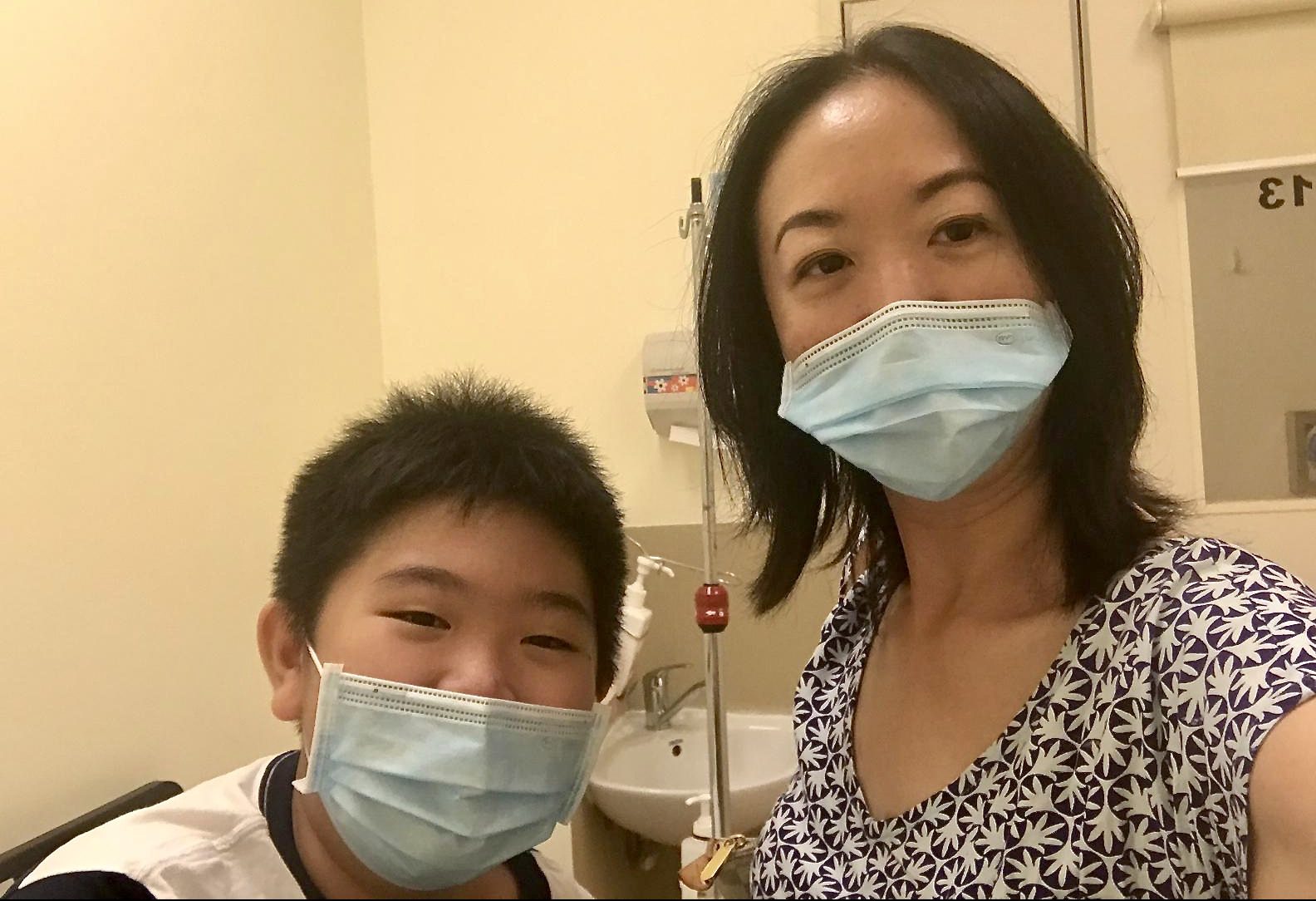
Kemmy and son Reuben at the hospital where he was swabbed because of allergies, waiting to return to their hotel. Photos courtesy of Kemmy Koh.
Her eczema was aggravated by the enclosed space and the stress.
But it was her son, Reuben, 11, who said: “Mummy, don’t get angry about the room. I think it’s fine.”
At Anglo-Chinese School (Junior), Reuben is a prefect and peer support group leader “who likes to comfort people”, said his mum.
“Reuben actually said, ‘Let’s make good use of this room. We’re staying in a hotel. Think of it as a holiday.'”
Reuben highlighted the positives of the room: The bed was quite comfortable. The sink was clean. They had a glass panel from where they could look down to the street and wave to his dad every day.
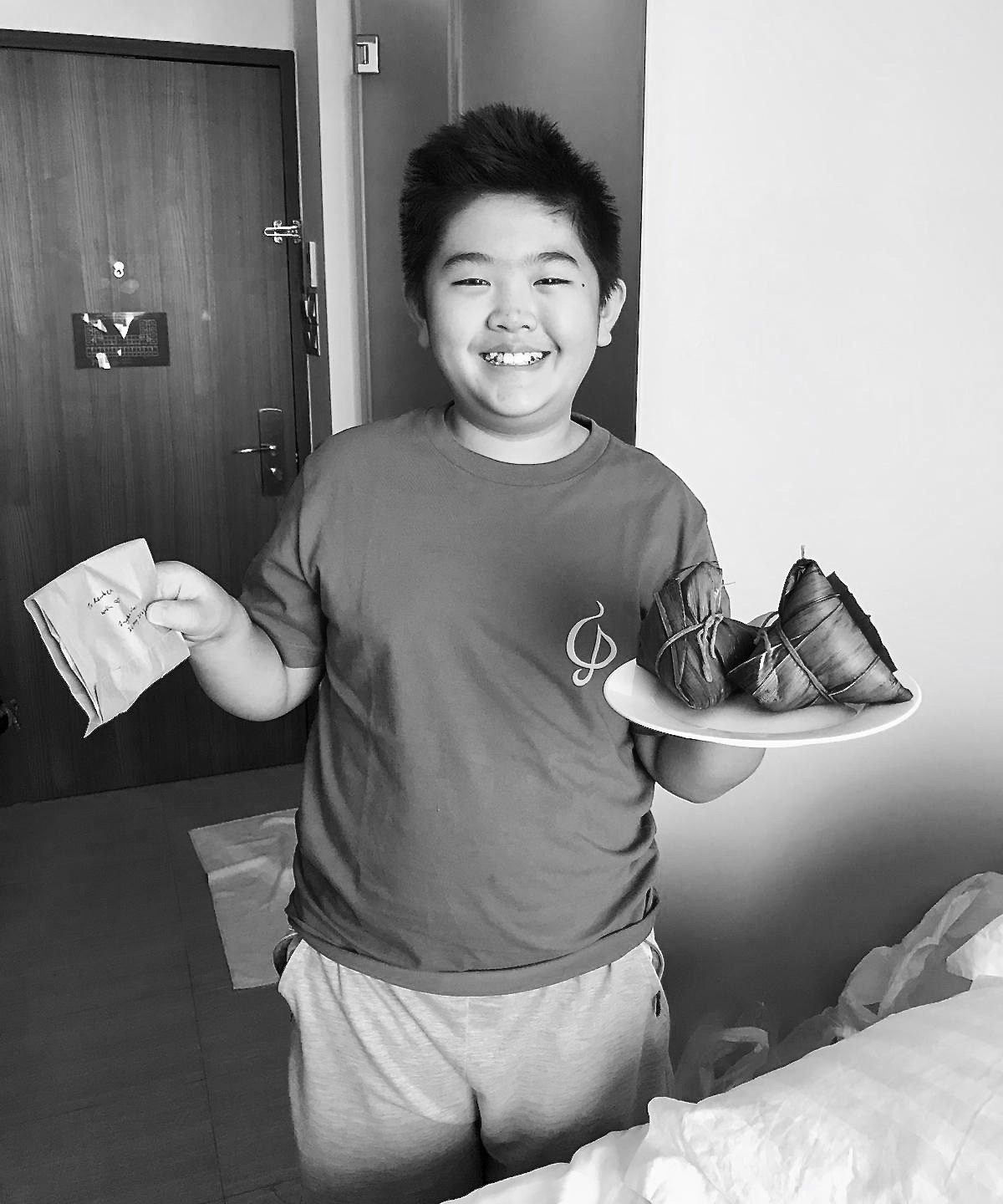
Friends sent food they thought Kemmy and Reuben might crave. This bak chang was delivered piping hot.
“Don’t complain,” Reuben told his mum. “Don’t make things difficult for people.”
So Kemmy worked around the limitations of the room. To preserve her privacy, she waited till her son fell asleep before showering, and she did not use the toilet when he was attending lessons online.
In the end she was able to thank God for the time she had to bond with her son, as well as for the thoughtful people who showered love and care on them, including friends who called from overseas when they saw her Facebook posts.
She marvelled that even strangers bothered to pray for them. “Prayers work wonders,” she said.
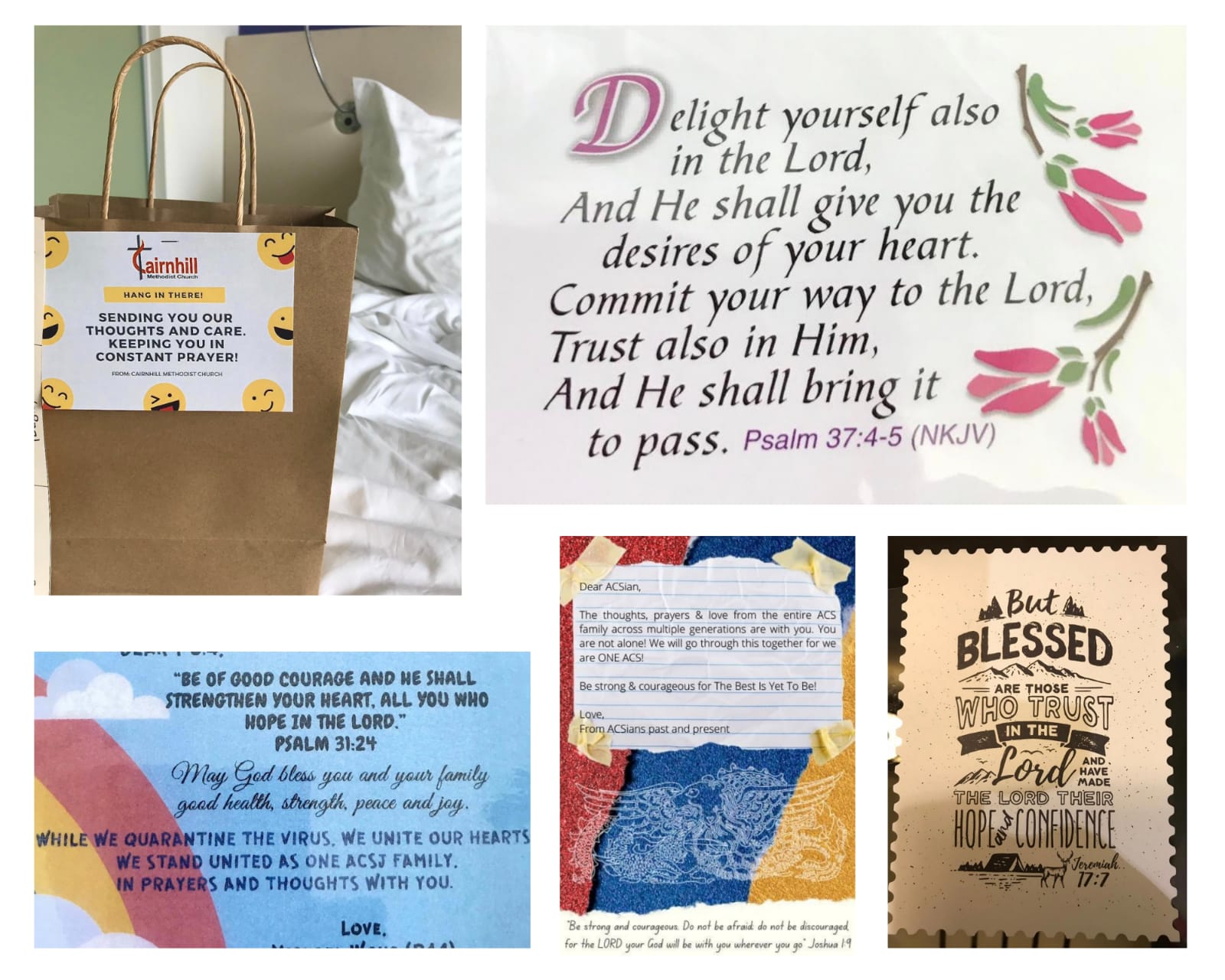
Some encouraging cards and care packs that Reuben and Kemmy received from well-wishers, including the school and strangers. From this outpouring of love came gratitude. And from gratitude, patience with her situation.
The school called up twice a day to check in on them. And former students of the school organised a seven-day Zoom series of workshops and worship for families in quarantine.
“When people started showing genuine concern and love for us, all the annoyances went away. “
“We are very grateful. The programme kept the boys occupied.”
She also noticed a change within herself.
“When people started showing genuine concern and love for us, I had a strong sense of gratitude. Thereafter, all the annoyances went away.
“So why am I concerning myself with things like the toilet with no doors?”
From this gratitude came patience in spite of some mix-ups and miscommunication. “I asked myself, ‘Why I cannot tahan?’ (Malay for “hold on”) I should learn to ren (Mandarin for “endure”).
“Yes, there were challenges. But the experience made me realise that I should not be so whiney,” she said.
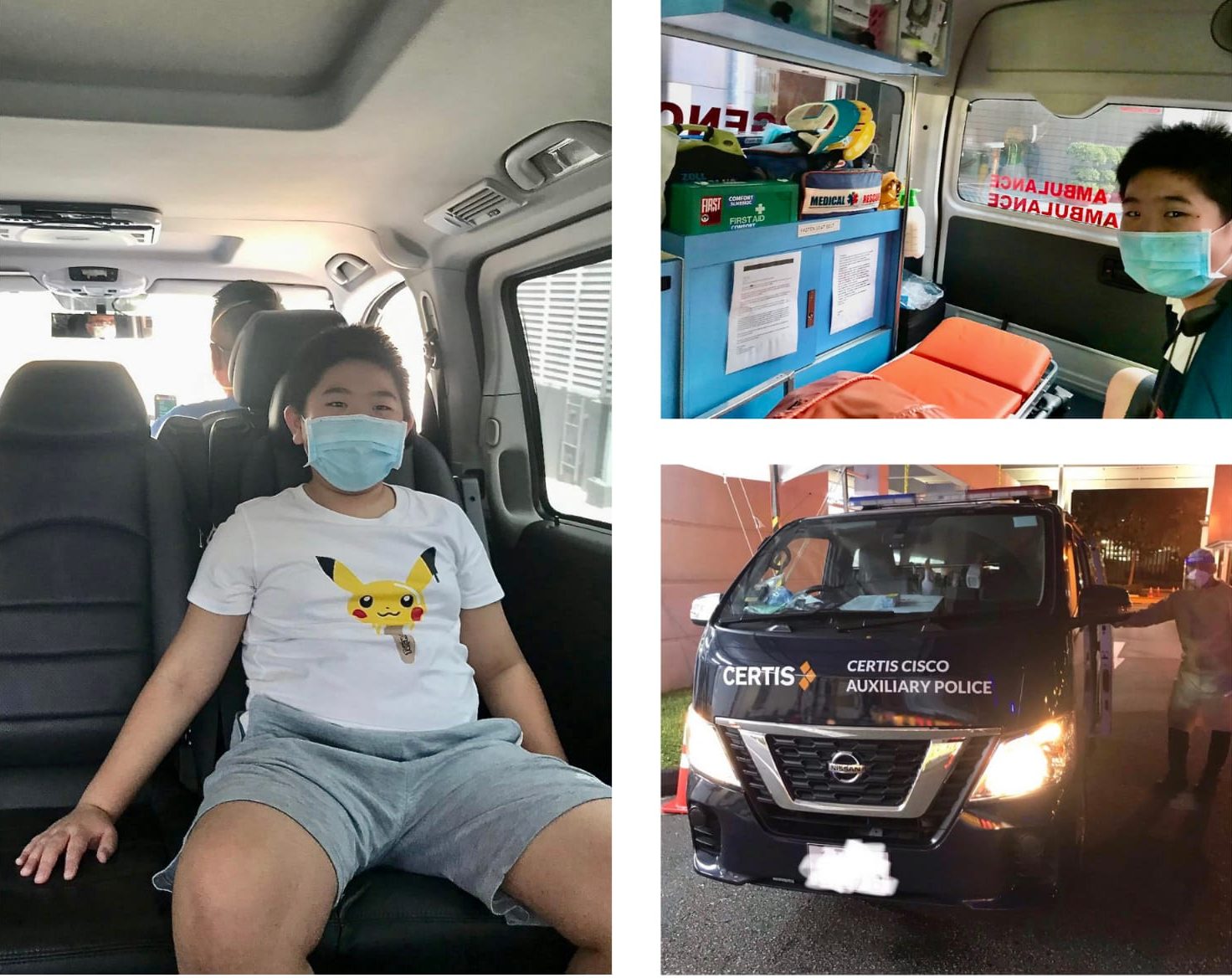
“A bizarre day of rides” is how Kemmy described her surreal last full day in quarantine. Kemmy and Reuben were picked up in a taxi limo and taken to a swabbing centre for Kemmy’s swab test and back to the hotel. From the hotel, they were conveyed to the hospital in an ambulance for Reuben’s swab test. After waiting for two hours, they rode back to the hotel in a Cisco van.
“In a pandemic, you just have to be thankful that you are safe, you are healthy, and you are not hungry,” said Kemmy.
“The larger picture is that the whole country is fighting the pandemic. MOH (the Ministry of Health) is so busy. They probably have a lot more urgent cases than to attend to people with eczema.
“The Singapore government is doing a lot and we are still safe.
“At the end of the day, God is in charge.”
Putting PSLE into perspective: Kenny Lew & family
Dad Kenny Lew, 48, a career coach, got approval to quarantine at home with his son who is Reuben’s classmate. His wife, Joanne, went to live with his mother in another unit in the same block. Kenny experienced the anxiety of passing the virus to his loved ones, including his mother and aunt.
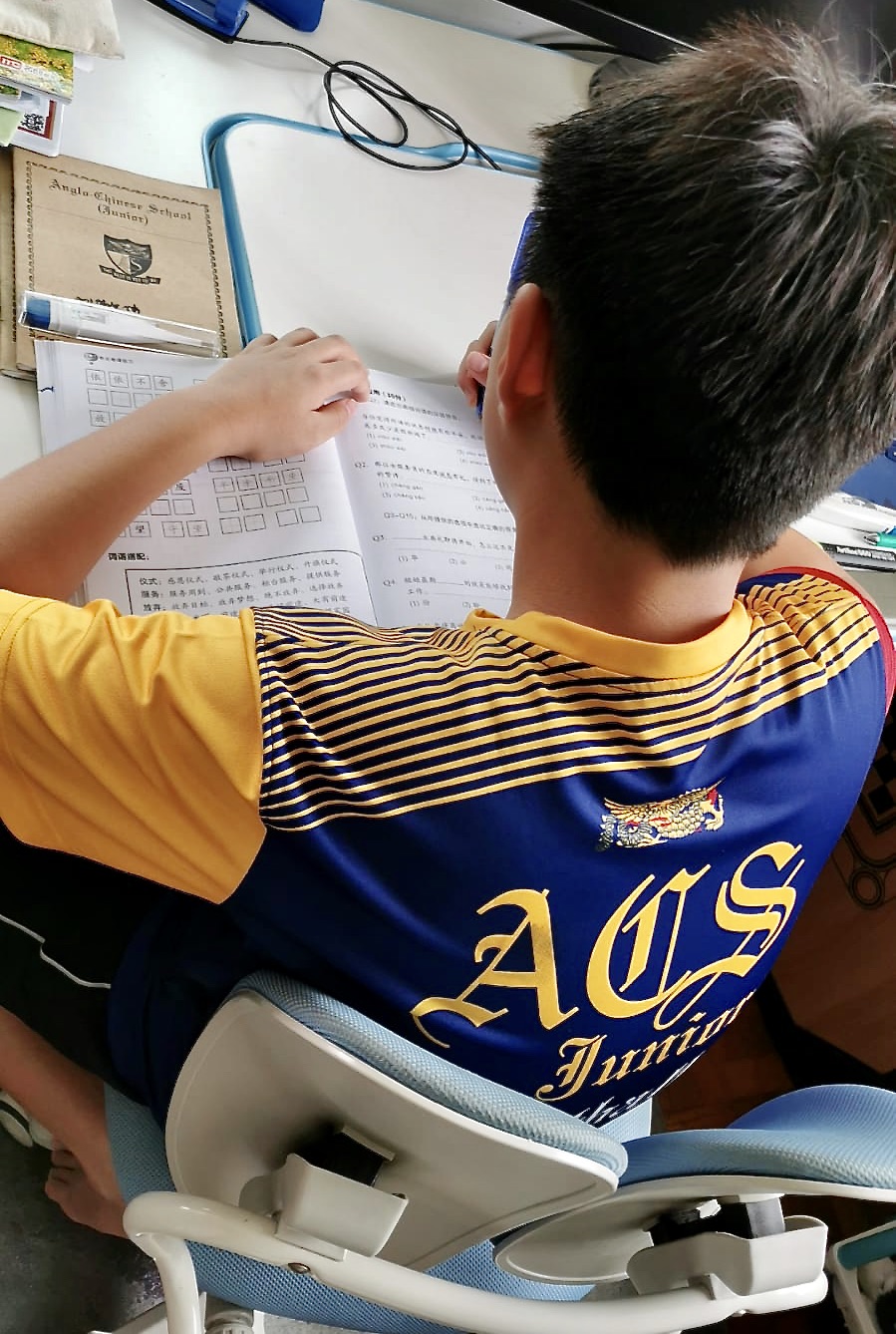
During their time in isolation, Kenny made it a point to watch the news with his son (pictured) to help him realise that there is more to life than homework and PSLE. Photos courtesy of Kenny Lew.
Without this crisis in their lives, Kenny Lew and his son would not have experienced “the immense outpouring of love, concern and encouragement” from their church and school communities and others – even receiving ice-cream from a university friend he had not seen in years, said Kenny.
When he posted photos of some of the care packs they received during quarantine, someone cheekily commented that they were very pampered, and asked: “What about poorer people?”
Said Kenny: “She made a good point. Yes, it’s true, we were pampered. We were well taken care of. We never felt forsaken, and people didn’t avoid us, blame us or the others (including the two classmates who had Covid).”
Mulling over what this friend wrote, he asked the Lord: “What can I teach my son out of this?”
“Being in quarantine really put into perspective what is important to us.”
He wanted to “cultivate a heart of gratitude and compassion” in his child so that he would “never forsake someone who is down and out”.
He explained to his son that the thoughtful things they received were from the school family, who led by example in showing love and concern for “those who had fallen”, not just in their school, but in the community.
He told his son: “So when you grow up, you will do likewise. This is how the tradition continues.”
During quarantine, Kenny also made it a point to watch the news with his son, to help him see that there is more to life than studying or leading a sheltered life.
He told his son: “You have to know what’s going on around the world and not take what you have for granted.
“We are very well taken care of in Singapore. But it doesn’t hold true for everybody else around the world. There are people struggling – even in Singapore.
“Try, if you can, to do something for the person. Pray for that person,” he advised his son.
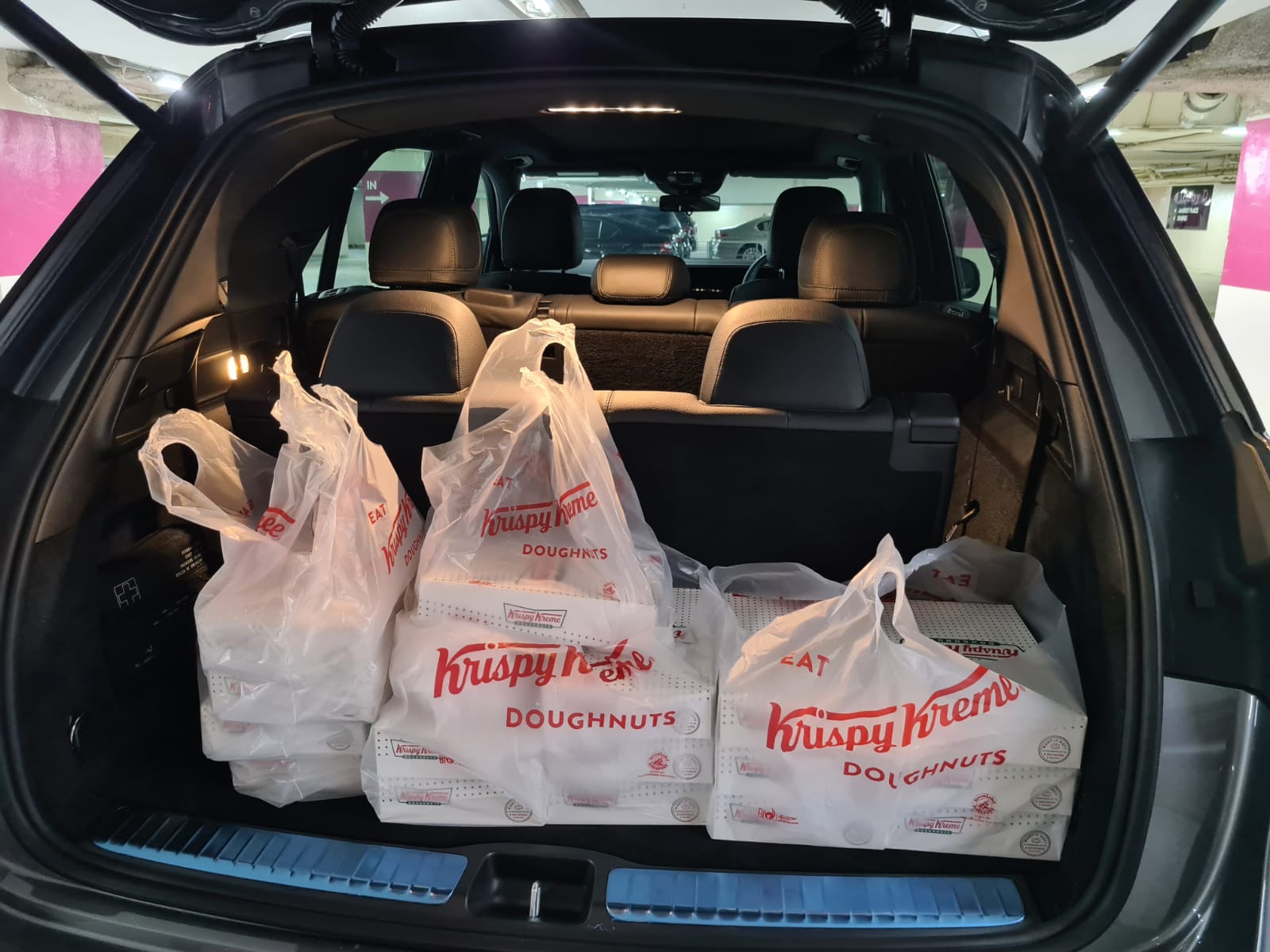
“Love can be infectious,” Kenny said. Touched by the love he and his son received, Kenny decided to treat the other families in quarantine to doughnuts. He enlisted the help of two non-quarantined fathers who drove to various locations to drop off the sweet treats (pictured). These fathers insisted that Kenny allow them to share the cost of the doughnuts. Once other dads heard about it, they also asked how they could help.
Quoting Luke 12:48, Kenny said: “To whom much is given, much will be required. It means we are held responsible for what we have. If we have been blessed with talents, wealth, knowledge, time and the like, it is expected that we use them benefit others.”
“When I feel helpless, shaken, stuck or uncertain, am I drawing close to God, or moving further away from him?”
Being in quarantine “really put into perspective what is important to us”. Their brush with Covid eclipsed the Primary School Leaving Examination (PSLE) which his son’s cohort will be taking later this year.
Kenny said: “Actually, it is a good thing because I don’t want my son to grow up thinking the year 2021 was just about PSLE.
“I think it should be the other way: ‘Oh, we experienced so many unique circumstances. And by the way, there was PSLE too.'”
From his reflections in isolation, Kenny, who leads a cell group, offered the following points to ponder:
- Am I bitter, angry, fearful or frustrated over my present circumstances? If I behave like that, then how can I others see Christ in me? How can God even use me to be a blessing to others? How are we committing our situation to God today?
- When others are in need, how have I demonstrated the love of God to them? If I am not helpful, what does it say about me? If you have received help from others, how will that motivate you to do likewise for others?
- When I feel helpless, shaken, stuck or uncertain, am I drawing close to God, or moving further away from him? If my circumstances draw me away from God, I will sink deeper into depression, isolation and condemnation (evil wins) – the world will still go on anyway. But if I draw close to God, then I will experience God’s peace and help. God can even use me to become a channel of blessings and influence to help others (evil loses). Which choice will you choose today?
Our Noah’s Ark: The Chong family
The Chongs – including a son in pre-school and a daughter in Primary One – were on a staycation and were at the hotel pool at the same time as two people who were subsequently diagnosed with Covid-19. They isolated themselves at home.
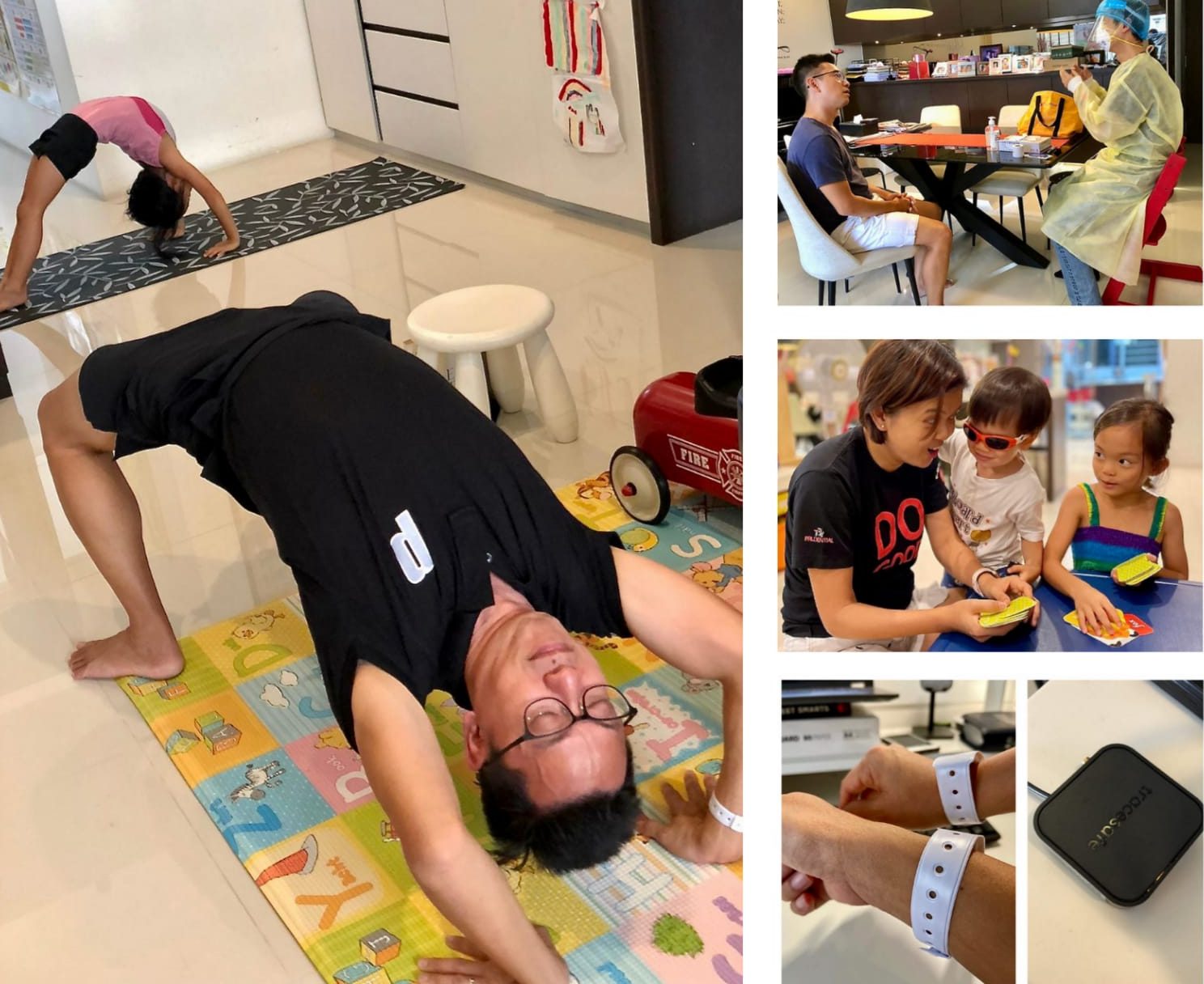
The Chongs in quarantine. (Clockwise from left): Dad Isaac accompanying daughter Grace, 7, during her Zoom gymnastics lesson. Isaac getting swabbed at home. Mum Laura playing cards with Joash, 4, and Grace. Isaac and Laura had to wear tracking tags with base devices placed in their living room and master bedroom. Photos courtesy of the Chong family.
“While playing with the kids on the bed and acting out the story of Noah’s Ark, God gave us the revelation that we were going through our own Noah’s Ark experience,” said Laura, 42, a wealth consultant.
“While we seemed to be trapped and ‘held captive’, God reminded us that He was protecting us and keeping us safe as a family in our own home.”
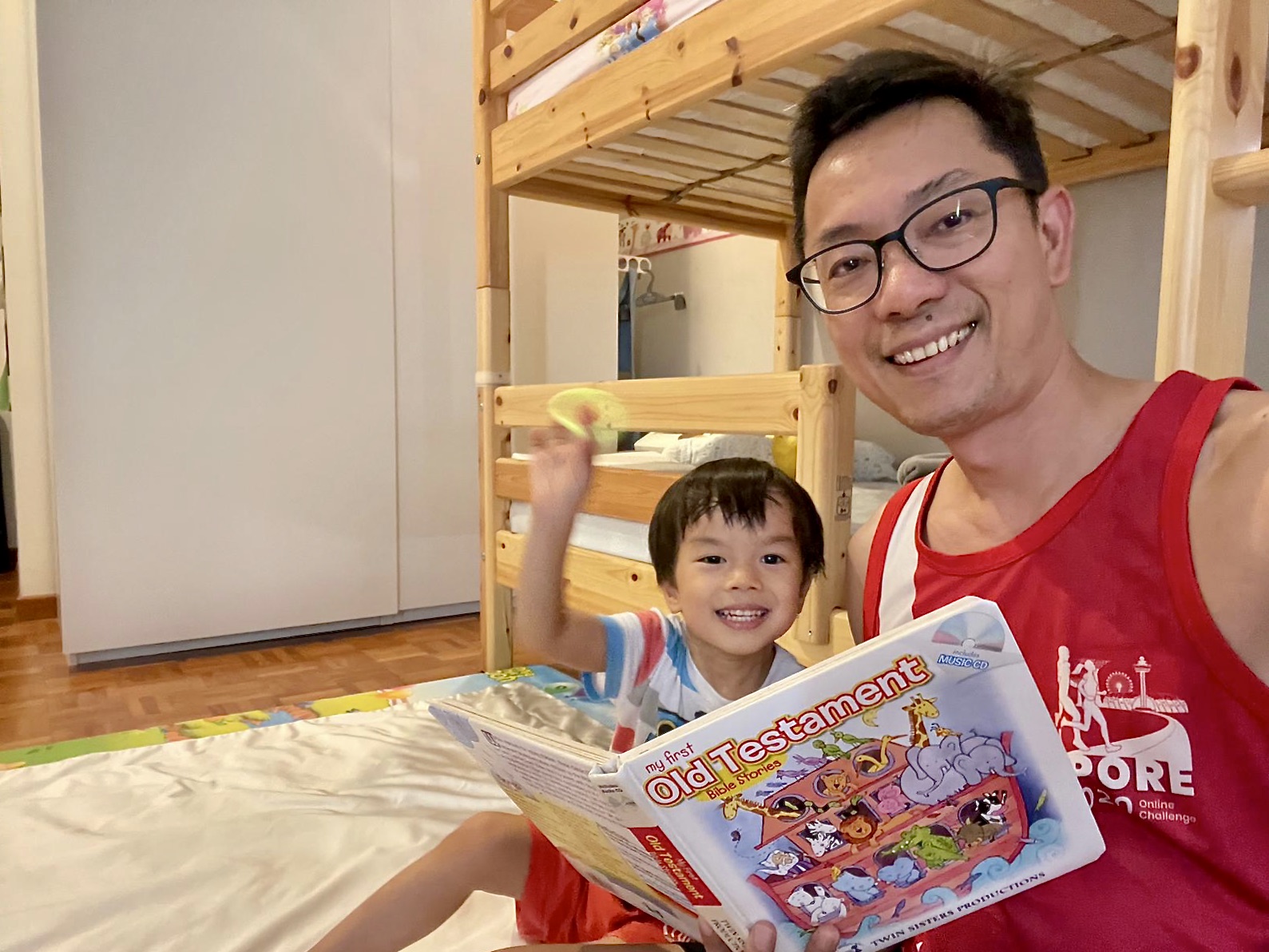
Isaac, 46, a senior financial services manager, reading a Bible story to Joash, 4. On the cover of the children’s Bible is an illustration of Noah’s Ark. Friends “went out of their way” to help them with other things they could not do: Buy groceries, start their car, collect their mail from their letterbox and their daughter’s textbooks from school.
Their 10-day quarantine was extended by five days due to an administrative delay in the release of their helper’s results.

Dad Isaac changing the gas tank because suppliers and others were not allowed into their home during their quarantine.
“It was like waiting for God to send the dove to give us a signal to disembark from our Ark. (Genesis 8:8-12)
“We learned to exercise patience and submit to God our frustrations and trust that He is still sovereign and in control.”
How to survive quarantine
The four sets of parents Salt&Light spoke to shared how they stayed calm and centred on God.
1) Find the “I” of the storm
For Kenny, who committed his family’s worries to the Lord, the song The I of the Storm reminded him of “the centre of my calm, the place where I can find shelter”.
“It talks about Jesus on the boat with the disciples. While the boat tossed and turned, the disciples were all in a frenzy. Jesus was very calm and said to them, ‘It is I.'”
He likened it to the centre a tornado where there is stillness. “I think Jesus is saying, ‘I am there. If you come in with Me, you’ll be safe.'”
The song, The I of the Storm, reminded him of “the centre of my calm, the place where I can find shelter”.
He shared the song with other anxious parents, reminding them that “the days ahead will be stormy, and you can’t feel the sunshine”, but “God’s light shines brightest in the darkest hour”.
Melissa found it hard to pray for a few days after finding out that her daughter’s classmate was diagnosed with Covid.
“It was hard to surrender. I was very angry. And was asking, ‘Why did God allow this to happen?'”
Then she went to the piano and played the song, Still, based on Psalm 46:10: “Be still and know that I am God.” The verse was was on her heart when Covid first appeared.
It bought her some measure of comfort.
“I had a strong sense that I had to let go of my anger and self-righteousness and forgive those I believed were responsible. Only then would I experience God’s grace and mercy.
“As difficult as this has been, I have seen God’s hand in the situation and that He is in control.”
2) Release a mighty tide of prayer
Said Kemmy: “With so many people praying for us at the same time, I think it moved mountains. None of us fell sick, there were no more transmissions after the two boys who got the virus.
“When you have people interceding for you, I think you will have the peace of God in you.”
“And even another two boys who developed symptoms were fine.”
Added Kenny: “We had so many people praying for us. How could we lose to the virus?
“When you have people interceding for you, I think you will have the peace of God in you.”
Said Melissa: “When we intercede, the tide will change.” In the St Margaret’s class, two girls who came down with symptoms during quarantine did not contract Covid.
3) Reach out in friendship
Contrary to what Kenny thought, he found that people cared.
“When I reached out, I was comforted in return.”
“This is something that we really cherish,” he said. There was one father he’d never met who called to check in on him once a day.
When Melissa reached out to offer support to mums who had been very quiet on the class chat group, “I learnt that when I reached out, I was comforted in return. I made many new friends”, she said.
She sent cupcakes to the girls she felt needed cheering up. And sent supplements to one mum to help her sleep. This mum in turn introduced her to another friend, which runs an agency – the exact one that Melissa needed for a work project.
“When you show kindness, you are often blessed in return,” she said.
4) Pay it forward
The four families may have been isolated, but they were not in isolation. Instead they were overwhelmed by an outpouring of love and support from their schools, friends, even strangers.
Their communities of prayer warriors interceded for them daily. “This was really love-in-action shown by our fellow brothers and sisters-in-Christ. We love because He first loved us. (1 John 4:19),” said Laura Chong.

The Chong family celebrated mum Laura’s birthday in quarantine with one of several cakes they were blessed with. Photo courtesy of the Chong family.
All expressed their gratitude to the frontline workers and ground staff – many sweltering in the heat under full PPE gear – who showed kindness and continue to work tirelessly to keep the community safe.
“Ask the Lord to open our spiritual eyes to see how we can be a conduit of His love.”
All families shared with their children the need to pay all this kindness forward.
“Love can be infectious,” Kenny said.
Said Laura in a text message sent to the Parents’ Prayer Group at her daughter’s school: “During this season when some of us could be experiencing challenges in various ways – health, finances, jobs, relationships, juggling WFH with home needs – let us ask the Lord to open our spiritual eyes to see how we can be a conduit of His love and blessings.”
To her message of encouragement, she added the verse Matthew 5:14-16: “You are the light of the world. A town built on a hill cannot be hidden. Neither do people light a lamp and put it under a bowl. Instead they put it on its stand, and it gives light to everyone in the house. In the same way, let your light shine before others, that they may see your good deeds and glorify your Father in heaven.”
*Names have been changed at the request of the interviewee.
RELATED STORIES:
Break my heart, Lord, for what breaks yours: Refugees, missions and you
We are an independent, non-profit organisation that relies on the generosity of our readers, such as yourself, to continue serving the kingdom. Every dollar donated goes directly back into our editorial coverage.
Would you consider partnering with us in our kingdom work by supporting us financially, either as a one-off donation, or a recurring pledge?
Support Salt&Light